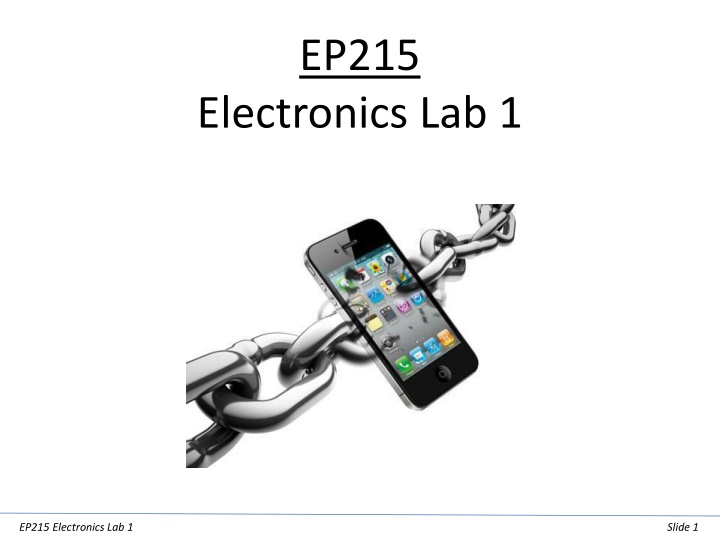
EP215 Electronics Lab Grading Scheme and Concepts
Explore the grading scheme and concepts taught in EP215 Electronics Lab, including the need for electronics techniques, the importance of voltage and current, and the role of amplifiers in electrical systems.
Download Presentation

Please find below an Image/Link to download the presentation.
The content on the website is provided AS IS for your information and personal use only. It may not be sold, licensed, or shared on other websites without obtaining consent from the author. If you encounter any issues during the download, it is possible that the publisher has removed the file from their server.
You are allowed to download the files provided on this website for personal or commercial use, subject to the condition that they are used lawfully. All files are the property of their respective owners.
The content on the website is provided AS IS for your information and personal use only. It may not be sold, licensed, or shared on other websites without obtaining consent from the author.
E N D
Presentation Transcript
EP215 Electronics Lab 1 EP215 Electronics Lab 1 Slide 1
Grading Scheme 70% labs + 30% endsem You will work in groups. Each person will be graded individually. You will appear for the endsem exam individually. Each group will get a lab kit containing components necessary for all labs. Keep your lab kit safe. You will receive a lab assignment on each Tuesday at 2pm. It must be completed in 3 hrs. There is no lab manual. You develop a procedure to solve the problem based on what you know about electronics. There is no journal either. Your assignments are set up in parts. All parts are graded during the lab session EP215 Electronics Lab 1 Slide 2
Why are you in Electronics Lab ? Why do you need electronics techniques ? What you can expect to learn by the end of EP215. EP215 Electronics Lab 1 Slide 3
Why do we need Electronics ? Physical Chemical System Small Electrical signal Amplifier Large Electrical signal Measurement Examples: Resistance of a carbon nanotube Signal deposited by a proton in detector at LHC Fluoroscence in chemical sample View an AFM image of a protein folding in real time. EP215 Electronics Lab 1 Slide 4
Voltage or Potential Current Power What do these terms mean? Electrical signal Device X current potential Heart pumps Blood flows EP215 Electronics Lab 1 Slide 5
What does Potential mean ? Literally the potential to do something Eg: potential of JEE entrant to become a good engineer potential of AIR 10 to do better than AIR 1000 In our case: potential to supply current on demand With reference to what ? EP215 Electronics Lab 1 Slide 6
Where does the current go ? 12V i Electrical signal Physical Chemical System current i GND Most of the current is used by the system: only a small amount sampled for measurement EP215 Electronics Lab 1 Slide 7
What does the Amplifer do ? 12V 12V i i Large Electrical signal Physical Chemical System Amplifier current i i GND GND Amplifier samples small amount of current and makes it big EP215 Electronics Lab 1 Slide 8
How do you make the measurement ? 12V 12V i 12V i i Physical Chemical System Amplifier current Measurement current i i i GND GND GND The final measurement device an analog to digital converter (Digital Multimeter [DMM] or Oscilloscope [DSO]) EP215 Electronics Lab 1 Slide 9
Problem of GND ! 12V 12V i 12V i i Physical Chemical System Amplifier current Measurement current i i i GND GND GND GND potentials need not be the same ! Matters a lot when current is small EP215 Electronics Lab 1 Slide 10
Ideal solution Use differential supplies source amplifier measure +Vref +Vref +Vref i i i Physical Chemical System Amplifier current Measurement current i i measure -Vref i amplifier -Vref source -Vref Make sure to use differential supply when current drawn from the system is small EP215 Electronics Lab 1 Slide 11
The Amplifier is the most interesting part +Vref i Amplifier current current i -Vref Assumption: 12th pass and JEE pass already know about R, C, L passive) We will focus on active devices that transform to , where and can be either/both current and voltage. EP215 Electronics Lab 1 Slide 12
Preparations for the lab Revise general electronics background: http://www.allaboutcircuits.com/ A community built website on all things related to electronics (like Wikipedia). Keep me informed of mismatches between your lab work and theory preparation EP215 Electronics Lab 1 Slide 13
Preparations for the lab Lecture Schedule: Work out an acceptable 1-hour slot for a weekly lecture: Suggestions: Wednesday 3pm to 4pm or Friday 3pm to 4pm EP215 Electronics Lab 1 Slide 14
